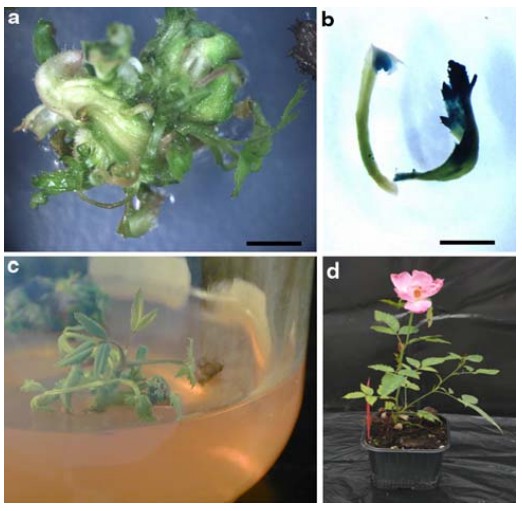Rosa chinensis is a compact rose species native to central China and widely cultivated as an ornamental plant. Currently, all the moon roses cultivated around the world are based on Rosa chinensis as the parent after a long period of continuous breeding and repeated hybridization, but only a tiny part of the hybridization process has the value of utilization, and the germination rate of hybrid seeds is low. The emergence of molecular biology and biotechnology, such as tissue culture and genetic transformation, has provided new opportunities to improve the quality of roses and to develop superior varieties. The regeneration of Rosa chinensis can be either by organogenesis or somatic embryogenesis, but the regeneration of transgenic Rosa chinensis is mainly by somatic embryogenesis.
 Fig. 1. Genetic transformation of RcOBType2 embryos. (Vergne P, et al, 2010)
Fig. 1. Genetic transformation of RcOBType2 embryos. (Vergne P, et al, 2010)
Lifeasible is an industry leader in the field of plant genetic transformation, offering a variety of solutions for Rosa chinensis genetic transformation. We aim to improve specific traits in Rosa chinensis by introducing target genes such as disease-resistance genes, chitinase-resistance genes, antimicrobial protein genes, and color-related genes.
Successful genetic transformation of Rosa chinensis relies heavily on efficient regeneration methods. Lifeasible has conducted extensive research and development of various regeneration techniques for this species, including direct regeneration, shoot regeneration, and somatic cell embryo regeneration. We can successfully induce somatic embryos and subsequently regenerate plants in Rosa chinensis using different explants, including leaf segments, internodes, stamen filaments, roots, and syncytial embryos.
We offer the following methods for Rosa chinensis genetic transformation:
In addition, we offer a variety of techniques such as enzyme assays, LUC assays, polymerase chain reaction (PCR) assays, North hybridization, South hybridization, and biological characterization for transgenic regenerated plants of Rosa chinensis. We ensure the presence and expression of transgenes in accurately transformed Rosa chinensis.
Through optimized regeneration methods and efficient transformation techniques, Lifeasible aims to introduce exogenous genes and target genes into Rosa chinensis to produce superior moonflower varieties with improved traits. If you are interested in our solutions, please contact us for technical consultation and quotation.
Reference: